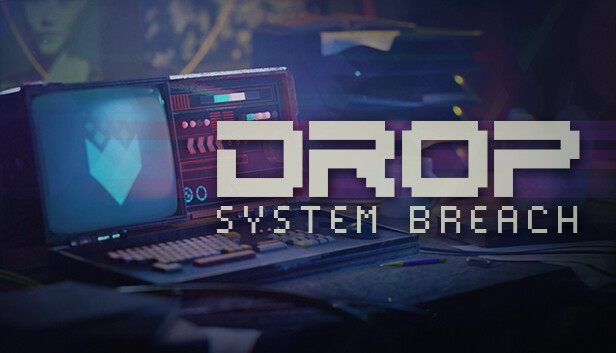This hacking sim tests your ability to breach computer systems fast, all whilst avoiding detection. But how does it stack up on Steam Deck?
Plenty of 90s action movies have sequences where somebody would effortlessly wheel themselves over to a desktop computer (or 'terminal' if you will) and start furiously tapping away at a keyboard, only for them to have, seconds later, successfully hacked whatever system was standing in their way.
These often cheesy depictions of computer hacking in media have long since continued — of course things have gotten a touch more accurate in recent years, with some sophistication and grounding in reality having found its way into such scenes.
Well, 'DROP — System Breach' gives you the opportunity to take up the role of such a prolific hacker. It's essentially that Hackerman GIF in videogame form.

This, rather abstract, puzzler from Etherfield Studio challenges you with completing plenty of computing tasks, adds in a touch of the classic Hollywood time-pressure, along with a bit of playful text dialog too — the result being a puzzle experience that quickly becomes a frantic race about getting in, getting the job done, and getting out as fast as possible — all whilst avoiding detection.
In the role of this mysterious hacker, you'll have to complete a series of tasks, initially in sequence, in order to meet certain criteria.

Your motive for doing these jobs isn't particularly clear, nor is it seemingly important to the experience — you're a hacker, it's your job — don't overthink the rationale for what you are doing. As mentioned, there is text dialog to accompany your hacking journey, but I didn't find it added much to the game.
The challenges you face may involve you having to acquire keycards, access certain details, or even install spyware on machines of notable people. The hacking simulation found within DROP — System Breach is fairly shallow however — the entire experience is played from a top-down 2D perspective, and you won't be picking up any real-world computer manipulation skills here, instead it's more about fast-paced clicking and completing timed challenges.
The core puzzle element is essentially found in the successful navigation of the computing space you find yourself exploiting, ensuring you discover key bits of information along the way.

It's a game of speed, spatial awareness, pattern recognition, and the virtual juggling of plates.
Your ability to complete these tasks increasingly depends on your overall computing power as you progress.
From job to job, you earn cash which you can use to upgrade your kit — namely your 'thread capacity' and CPUs. Your 'thread capacity' essentially just lets you do more than one thing at a time, and unsurprisingly, upgrading the CPU speeds up the processes you find yourself running.
As you get deeper into the game, the sheer number of things you have to do in order to find success ramps up. As such, the need to upgrade increases too. It's here where bonus cash comes in handy — complete jobs quicker or meet additional objectives (such as downloading copies of certain files, or deleting data) and you'll snag extra cash that you can use to beef up your hacking abilities.
This 'digital manipulation' is what makes up the puzzle experience on offer here.
It begins simple enough, with just a few tasks per job, but soon becomes an increasingly stressful undertaking — especially when the time you're given for each job gets stricter and stricter.
The game chucks more things for you to worry about as you progress, such as having to think about access logs, firewalls, and more. Drop System Breach not only tests how good you are keeping multiple things going, but also your capability to actually remember to keep them going. Each new mechanic requires a slightly different approach in terms of sequencing — your ability to remember what to click and tap in what order is what's tested — almost like an increasingly challenging game of Simon Says.

DROP — System Breach does have its moments where the race against the clock presents tight, to-the-wire finishes — and completing it all and getting out without attracting attention offers a modest rush of excitement at pulling it all off.
Paying attention to minute details becomes of key importance if you want to succeed in finding the information you need to progress. Sometimes however, I found the rather enigmatic design of the game, although fitting, problematic in places — from an accessibility perspective I would have liked the on-screen text to have been bigger on Steam Deck (or at least adjustable). It's otherwise got a well suited cool 80's cyber vibe throughout — and text size issues aside, it plays great on Valve's handheld.
Drop System Breach presents a relatively simple enough premise, with the core gameplay experience being one that's easy enough to understand — it's a puzzle of fast-paced movement where the challenge lies in successfully interacting with the space you find yourself in. The difficulty ramps up at a decent clip, and the late game is particularly challenging.
Ultimately, your appetite for such task-based experiences will determine how much you get out of this one — the primary gameplay is sound enough, but beyond the difficulty spike of spinning an increasing number of plates, what's on offer doesn't alter too much as you progress.
The puzzle element isn't particularly deep and the overall experience won't really leave much of a lasting impression, but the action found in this hacking sim does offer up a distraction that is enjoyable and lively in places — and ultimately if impersonating a Hollywood-esque computer hacker has appeal, you'll find something to like here.




